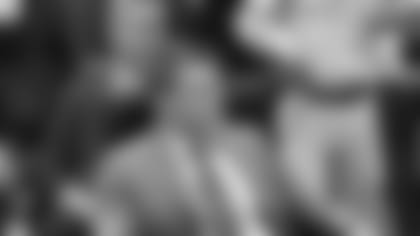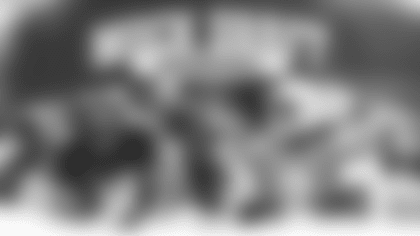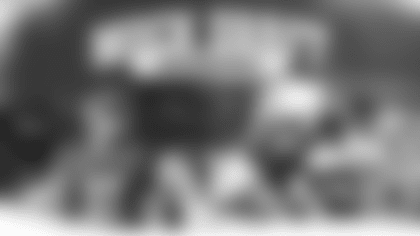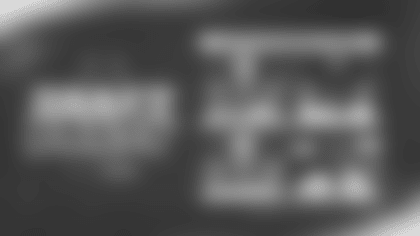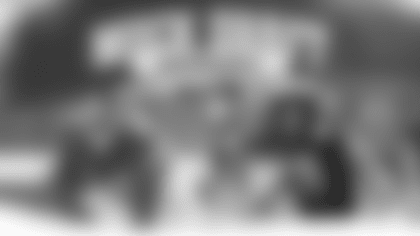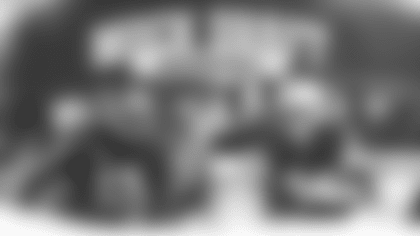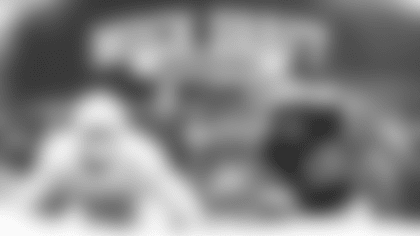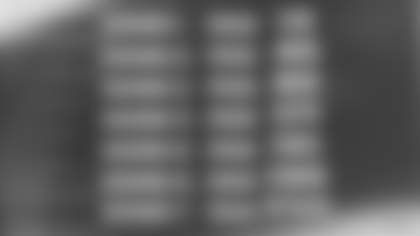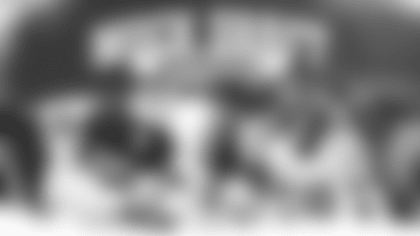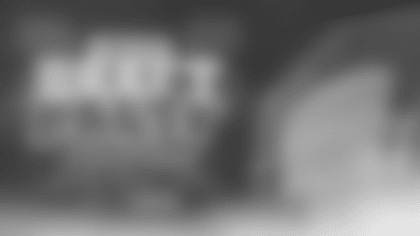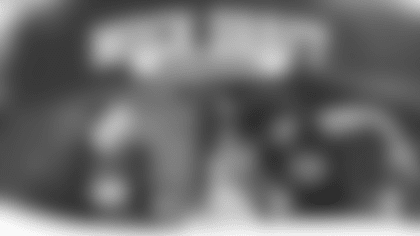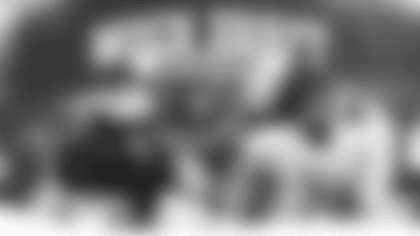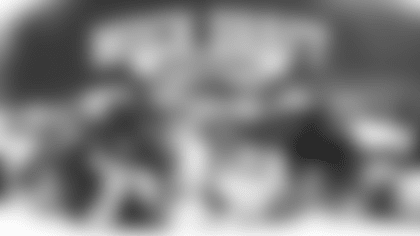INDIANAPOLIS —You want to know how Chris Ballard really feels about his draft class? What about some of the players returning for the Indianapolis Colts?
The second-year general manager on Monday invited members of the local media into the team's draft room for a rare, in-depth look into the team's thought processes into why it landed on the 11 players it did in this past weekend's NFL Draft, as well as to chat it up about anything else that happened to come up.
The meeting featured a terrific look into the players' film itself, from their pro day workouts, to their Senior Bowl practices to their top collegiate games.
If you want the nitty-gritty on the Colts' roster, this was the place for you.
Fortunately, the Colts.com crew also had a seat at the table. Here, we'll empty out the notebook from this two-plus-hour meeting, where all sorts of topics were covered:
On the scouting process: "When we evaluate for our team, we're evaluating for *our *team. We don't evaluate for the league. We evaluate the fit for us schematically, coaching-wise, community-wise, team-wise. And it was nice this year, because we were able to kind of train our scouts: 'Hey men, this is the type of guys that we want to be Colts.' And it's an exhausting process. And, look, at the end of the day, I don't know if I've ever seen more '49s' — we have a list of '49s,' which just aren't fit for us, either from a character standpoint, from a schematic standpoint. I think we had 65 names on that board that were drafted. They just were not fits for us. So we were pretty strict — and I was very strict, especially rounds one through five — on the type of people we were bringing into this organization. And it was important for us."
On the public/media perception of the team's picks:"I've never worried, never in my career — and I learned this at an early time — I never worried about what anybody else thought; never worried about what all the experts thought. I worried about what we thought, what I thought, what my eyes saw, what my work trained me to do saw. And the value of the player is to us, not to anybody else. What's the value to our team? That was what was critical and important for us when we're making decisions on players, and I could care less what public perception is. If we build a winner and build a good football team with guys that love football, will work, have to go through all the criteria that we want, it will work itself out. Any kind of negative energy that comes out because they're pissed 'cause you took somebody always turns around. … But time proves you right, if you're right. It's not the moment; people get worried about that moment of being criticized or embarrassed or criticized in that moment, when time proves you right — if you're right on the player."
Ballard gave the example of when he was with the Bears' personnel staff and the team selected cornerback Charles Tillman in the second round over a popular University of Illinois product, Eugene Watson. "And we got crucified in Chicago. … I didn't know any better. … That was hard pill to swallow because people beat us up on it."
On evaluating a prospect's character;"I tell scouts "get it close to the hole … the tape, and the talent, we'll get what we think. But the character, get it close to the hole. If you can get it within 80, 90 percent of what this guy is, then you've done a great job." … you don't know until you get him in the building, so we want to get it as close to the hole as we can. And if there's any indecision, it's hard for me to pull the trigger on draft day. It just is, because that's the art of this, is getting the right type of guy, the right type of people, in the building. Are we always right? No. Absolutely not. Everybody's going to have their misses. It's going to happen."
On forming the big board:"I mean, we sit in here for hours. I mean, in February we go for 17 days straight, we go from 8 (a.m.) to 8 (p.m.) and we watch tape on every player. We come back in March, me and the pro scouts will sit in here and re-watch every guy we have on the board again. And then in April we bring the scouts back in and re-watch the entire board again, from Round 1 through (undrafted) free agents. And it's exhausting. We do it position-by-position. And it changes. … Every time you watch a tape, you see something just a little different."
"I think we had 216 on the board, which is too many. Last year was ridiculous — my first year here. I don't know how many we had. It was a different grading scale; I was using their grading scale trying to match my mind with how to slot them. But we had about 216 this year. I would like to get to where we're between 150 and 175. That's when we've really got it trimmed back."
Ballard said the board "gets dirty" in the sixth or seventh round, as scouts will "push guys up" to try to give them better grades than they maybe deserve so that it will increase their chances of getting looked at by the team.
On keeping track of other teams' interest in prospects:"You start getting the teams that are there (at pro days). They'll hide, and they'll be around. … Teams track it. They track where you're at and where you're sending people to work people out to see who's interested. And there's some teams — I'm not gonna name 'em — but if they've got a coach at the workout, there is no doubt that guy is on their draft board and they're interested. No doubt about it."
The Colts, Ballard said, send a scout to every single college pro day. "We don't send a coach to every one — not many."
On the importance of the Senior Bowl: "Now you're watching apples to apples here. Because most of these guys are going to go play in the league. It's really one of the only shots you can get — that's why the Senior Bowl is so important, and the better players we can get in it, the better it is for the players and for us. Because it's just like being in an NFL game. Now they're not at NFL standards yet, because from a technique standpoint, from a size and strength, age standpoint, they're not there yet, but it's still apples to apples, and you don't always get … that's a big thing. Who's he facing? Who's he playing against? Because it's easier to play against the lesser competition. But who is he playing against?"
On what he likes about switching to a 4-3 base defense:"It's a fun feeling on Sunday to go out there with four guys and rush, and play a little zone coverage. And even if they complete a ball on you, you tackle it, and we line up again and we rush again."
On why he didn't wait until closer to the draft to trade back from No. 3-overall: "I thought a long time about that, too. I didn't want to get boxed in. We're at three — to me, that was the third-best quarterback. So they had to be really driven to get up there and get the third-best quarterback. … And then you had the second pick in the draft, who I kind of had an inkling (the Giants) were going to stick with Eli, so if they weren't going to take one, maybe they trade out. And maybe they trade out with a guy they just worked with — (Buffalo Bills general manager) Brandon Beane. … There's no market. Like, if he get to the punch, we have no market now."
On if he feels the Colts have enough receiver depth heading into camp: "Yeah, I think so. There's some of these guys we signed kind of as future guys that are interesting. You know, Dres (Anderson), who was on the practice squad last year, we almost moved him up at the end. Seantavius Jones. You know, one of the things that we emphasized, if you saw the past, to me, it's the 1, 2, 3, and then 4 and 5 have a trait that if they get in the game, they either play inside-outside — but they also need to play on (special) teams. I mean, I thought that hurt us in the past. It got almost to a frustration point with me last year, because when your roster's really good, that fourth or fifth wide receiver, they're playing on teams. That third tight end is hopefully playing for you on teams. And we just didn't have that. And that's my fault for not recognizing it sooner. That's why I made sure we addressed it. That's why the two kids we drafted — now (Deon) Cain, Cain's got upside. Cain's probably got (Round) 2 talent; I mean, we'll see if he can get to his ceiling. (Daurice) Fountain was perfect, because Fountain's got a lot of upside, too, from a small school, but Fountain is big, he's got strength, and he's got toughness to play on teams as a core player on teams as he develops as a wideout."
On how tough the team will be in training camp: "Look: we'll get after it. I said it last year: we fell apart. I just underestimated a few things. That's my fault. But you've got to spar. You've got to spar, man. I mean, how do you get better blocking people if you're not going to be physical up front? How do you get better at tackling if you're not going to tackle? I mean, those are things you have to do. It doesn't mean you have to do 'em every day, but your front people need to get after it every day, especially when the pads are on. … To me camp is when you find out who is going to be with you in November and December when it gets hard. … And you can see, after a really hard day, the next day who shows up. That's who's going to be with you in November and December. That's who's going to last, and that's who committed to really improving at their craft. They know that, I mean, look, football's a hard sport. It is. It's a hard sport."
On the tough part about trading for a seventh-round pick: "(He) might be one of the neatest kids. Oh, I mean, those moves — those aren't easy calls. He's got it all. He's everything you want."
On cornerback Quincy Wilson not playing much last season: "He was hurt. … I think there's always more to the story, is all I'm going to say. Hey, did he have a great rookie year? No, he didn't. I thought he played well at the end; I thought he had a good play at the end that was really good."
On Antonio Morrison's role in the defense: "He has to be a MIKE-SAM, and really, more of a SAM … because we'll ask our SAM a lot to hammer things down inside, which he should be really good at, because that's what he is. He couldn't play WILL for us."
Ballard recalled being "spoiled" with the Bears, "because (Brian) Urlacher and (Lance) Briggs never came off the field. We'll have to play a little bit more sub stuff, then eventually you'd like to get it to where your MIKE and WILL don't have to come off the field. It just makes it better versus the run in those situations.
On linebacker Anthony Walker's progress: "Pretty good. He got his weight back down to about 238, I think. He'd be a MIKE-SAM also."
On running back Marlon Mack: "Like, everything with Marlon was better than I expected. Everything. And I know he had some pass protection issues, but he also did some good things in pass protection for a rookie back. He ran between the tackles better than I ever expected. Just because it was all that outside-run (stuff); they were in that high-tempo offense, outside run scheme — that was a hard evaluation to know if he could do it, but our scout was driven by the kid. He kept saying he had done so much work on Marlon — you know, what his makeup was; he had played safety in high school, so he had some toughness. The coaches raved about his toughness. He said it was just kind of a byproduct of the offense."
On safety T.J. Green: "It's a big year for T.J. I like him. I like the kid. I think he's tough. I do think the scheme will help. We're gonna put him in one spot. That was a little my fault last year; I don't blame that on the coaches. Blame it on me. (Trying Green at cornerback) … (I was thinking) let's cut the field for him, because he's talented enough to do it. That was all me. And then he had the struggle in L.A., and he can't play corner, and let's kick it back to (safety). … He's a safety. … In Kansas City we wanted him as a corner. That's what we wanted him as. … He could do it. He could do it. But I thought the end of the year, last couple games you saw some real flashes from him. You know, you forget: T.J. (in college) was a one-year starter; what was he, 20, when he was drafted? He's only 23 years old. … It takes times for them young guys to understand what it takes to play in this league."
On quarterback Jacoby Brissett: "Look — you all know my feelings on Jacoby. I love Jacoby. You talk about a guy in the locker room that gets it. I mean, he gets it. Bill Parcells told me that. He goes, 'Chris, if he's good or not, I don't know. But everything you want in a quarterback, in terms of intangibles, he has. Unquestionably, he has it.'"
On running back Robert Turbin: "Let me just say this: I don't want to downplay Robert Turbin. Great short yardage — I think he was the best in the league two years ago? Great professional. Pass pro's great. Robert Turbin, that guy's a pro and he's going to be good for these young guys. I'll say that. … (Hard to keep when he's a one-trick pony?) When you've got good flavor around him, I don't think so. I know Rob's got to do his part, but when you've got other guys around him — and look, if you look at Philadelphia, they had four backs; they had four backs on the roster."
—————————
Film session: Quenton Nelson / guard
"For being 6-5, he has got some freaky flexibility."
"I want to see in the workout, 'Can I see it on tape? Can I see what I'm seeing in the workout on tape.' If you can't see it on tape, he's got no shot — he's just a workout warrior. But if there's enough clips in there to say, 'OK, I see the workout. I see the speed. I see the burst. I see the flexibility,' that's what we're looking for."
*
(Pro Day)* "Quenton has just got some … I mean, he's just got some … I mean, God just made him a little differently than he did the rest of them."
"This is a big man that can move and pull. And y'all laughed when I told you I could feel him … and you can feel this kid come off the ball."
(Pushing New York Giants assistant coach Ben Wilkerson, a former NFL offensive lineman, with ease during pad drill) "Yeah. He's pretty rare. He's pretty rare."*
(On taking a guard so high in the draft)* "You know, I started thinking about that, because everyone's says, 'Well, you're taking a guard in the top 10.' I mean, people forget, Leonard Davis was the second pick in the draft; Brandon Scherff was the fifth pick in the draft here a couple years ago. I mean, to me, O-line is O-line, and I think y'all all in here understand the significance that I believe in. I just believe that you can't win if you're not good up front. It's hard; it makes it hard. It makes it really hard in the winter months, when you get into December and January football and you've gotta go play outdoors. Big men, athletic men, up front — I mean, it wins."
(On what would've happened if defensive end Bradley Chubb wasn't selected No. 5 overall by the Denver Broncos) "There would have been a discussion. … He's a good player; Chubb's a good player. And he checked all the boxes that you wanted. Chubb's a good player. … There'd have been some discussion because of position value, but I'll say this: this guy's (Nelson) probably got more upside unique. Chubb's a great player, now; an absolutely tremendous player. But this kid (Nelson) is really unique — and his makeup's unique. I mean, to me, when you take a guy like this, this tells your locker room what you stand for. When he walks in, and they watch him work and they watch him play and they watch him practice, this is the standard. This is the standard we hold. And they've got to come to this standard. … To me, Nelson was an easy pick, because he's everything we stand for. And the locker room knows it now. He's everything we stand for."
(On the Colts' reaction when the Cleveland Browns took cornerback Denzel Ward — and not Chubb or Nelson — with the fourth pick) "That's one of the first times that I have ever heard claps in a room. … We were happy. And Ward's a good player. Ward, I mean, he was the best pure cover guy in the draft. Without question."
*(On not addressing the defense first in the draft) *"We're young. We're young. But you've gotta start somewhere, don't you? I mean I understand we have needs. We have a lot of needs. But you've got to start somewhere. And if we're going to start somewhere, we're starting up front. We're starting on the O-line/D-line."
"There's some times where he'll overset. There's some times where he'll get a little top-heavy. But when you watch this, I mean, golly man, he's got bend in his knees, he's got change in direction. … And he is a very diligent, dialed-in guy when it comes to work."
"And even when he makes a hair of a mistake, he's still got the lateral quickness to be able to react back to it."
"Signature game" was against Georgia … "Even the one game he had a few struggles … he had some (misses) on some twists against Miami when they were getting their heads beat in, but he still was good 85 percent of the game."
"It's the easiest pick that I've ever been a part of. By far."
*(On if he saw that Sports Illustrated's Andy Benoit gave the Colts a “D-plus” for their selection of Nelson) *"Everybody's got their opinion. They complain about when our quarterbacks get hit; they've been hit more than any other quarterbacks in the league over the last five years, but people forget that on draft day. Because it's not sexy to draft on the O-line."
*(On if Ballard's wife knew he was going to pick Nelson) *"No. She didn't. She didn't. Cash did, my one son. All the rest of my kids were fighting for Barkley. I said, 'Well he's not going to be there.'"
—————————
Film session: Kemoko Turay / defensive end
"What I'll tell you is, I do believe he would've gone off in the next 10 picks. I have no question about that. It's not like he wasn't coveted; he was a coveted guy. … So, I think he had two shoulder injuries that hindered him for a couple years. And then I think he played in the 3-4 where they dropped him a bunch (into coverage)."
(Pulled his hamstring during the Combine) "And then they're working him out as a (linebacker). Like, I didn't think he was a backer. He could play as a 3-4 outside backer without question; I think we're going to be able to help him because now he can just get in a three-point (stance) and go, and rush. I mean, that's what the scheme allows for."
"Is he a little raw? Yeah, he's got some rawness to him. But there's two things on tape I thought I always saw: he's got some natural pass rush, and he plays really hard. And (Tarell) Basham was the same way. One thing I'll say about Basham is he empties the tank."
(Senior Bowl practice) "This is where it showed up for me. I remember sitting out there watching, I'm like, 'Wow.' I didn't even know who he was, to be honest with you. I mean, our scouts had a good grade on him, but I hadn't watched him yet. And I watched him right when I got back."
(On pass rushers like Turay trying to find their way in the NFL) "These tackles are good, and they change it up on you, so it takes a year or two for these rushers to figure it out. … It's a struggle for these guys early. Because they're used to just being better than the tackles in college football, and they can just run around them. But when they get to our level, they start getting guys that really know how to take angles and play, the snap count's different — now you've got a guy at quarterback who will change the snap count on you all the time, so the get-off is different. I mean, it takes time to learn how to play the position and how to rush."
"You'll see him go by, but he knows how to level rush, which a lot of rushers don't. … When he feels the depth of that quarterback, he's got a pretty good feel naturally of how to work back and level back out, which, to me, is an instinct thing. And everybody talked about the kid didn't have any instincts; I kept saying, 'Well, I disagree.' I think he does have a natural feel of how to rush. Now, does he need to work on his hands? Does he need to work on continually working a counter (move)? Yeah. Most guys that come into this league do."
"I also think he can do some of this for us, where he can kick inside and rush."
"He's pretty talented, and he's got a lot of upside as a player. And he's a good kid — and he'll work."
—————————
Film session: Braden Smith / guard
"Now Braden's not … he is not Quenton. … But this kid, I mean, he's a big man, a big talented guy, great kid … He's a big man who can bend and move."
"We thought his workout was really good. … This three-cone shows about everything you want. It shows if you can bend and change direction at the same time, if you've got body control to get around both of these cones, and then if you have acceleration to get through it. … So this kid's a really good athlete, and we think he's going to translate really good to what we want to do. He's good feet, he's got good bend, he's strong."
"You see the twitch, you see him getting out of his hips. So it's in his body — now we've just got to continue to train it and work it."
"There's some things with his hands that still need work. His pass (protection), he's going to need work. … See how he's undercutting everything, or forklifting everything? That's all stuff that we'll work (on). I mean, look, every coach has a different way of technique that they teach. It's just going to be too late in our league."
"This is what we think he can do really well, which you didn't always see (on Auburn's film) because they didn't run much zone-scheme stuff, so I (wanted to see) how much lateral quickness does he have? But you can see him put put him up and down here, and with a runner … he is a really good athlete for a big man."
"Watch right here; watch his hands. So not bad, not bad, and then watch what he does here … see that? He's so freaking big and strong, he thinks he can just … and he's able to anchor. But this is an area that Braden's going to have to get better at — and he will. But he's such a big, strong dude."
—————————
Film session: Shaquille Leonard / linebacker
"So this is one of my favorite guys. … And he's a neat kid, man. And he is driven, he's got a chip (on his shoulder). So he pulls his hamstring, and he's got a little Frank (Gore) in him in terms of his passion and caring about it. So he was about 85 percent during this workout. But coaches hadn't had a chance to work him out, so he said, 'I'll go. I'm working out.' And you'll see at the end he'll get tired, but, hey, there is absolutely no quit in him."
"And you never know. You hope with small school guys they progress. And I'll show you the game that convinced me; and it was Clemson, (2016) vs. Deshaun Watson. But this kid's a long, rangy guy. I think he's made for what (we want to do). Y'all had a guy (like him), David Thornton."
"This kid is a really talented athlete, and we'll live through some (growing pains) with him, but he's got the one trait that you can't coach: he can really run. Like, I think we got him at the combine at 4.61 (40-yard dash), but last spring he clocked at 4.53. I mean, this kid can roll."
"We're going to play him at WILL; so our WILL be covering."
*(On him playing in a 3-4) *"You can see the flashes that he could do it. He's never going to be a two-gapper … and our defense doesn't ask for a guy to two-gap. Our guys, they're going to be hat in a crack, get downhill and get in a gap — fast. … This is the stuff that you can really see (the speed). It really showed up at the Senior Bowl, especially when he was covering those backs. So this is what we're going to ask him (to do); so why this defense is good is the WILL's always lined up behind the three (technique)."
—————————
Film session: Nyheim Hines / running back
(Is he the returner?) "Yeah. He needs to work on the punt return stuff, but he's pretty talented. I mean, look: I just go right to speed. So from Devin Hester, to Johnny Knox to Daniel Manning to Tyreek Hill, I mean those are all guys I've been a part of drafting, and they all had one common trait: speed. Every one of them. … This kid's a neat kid, too. Really smart. He's got all the intangibles you want."
"He played at pure slot receiver the year before. Our coaches really have a vision for him. … When you can see it, both of you can see it, of what this guy can be, that's usually a pretty good chance of success when both sides can see it. And even though he's short, he's 198 pounds. It's not like this is a little (guy). I mean, he's got thickness; he's got thickness in his butt, in his hamstrings and in his quads."
(Can he pass protect?) "A little bit. It's going to need work. I mean, and it will get work with Rath (Tom Rathman). Tom, he is demanding, now, on the pass protection stuff."
"This is where … what gives Hines a (leg up) is that he can do so much in the passing game. You can him up as a slot, you can line him up with another back, and all of a sudden now he's in the slot and you've gotta choose … from a defensive standpoint."
*(On if head coach Frank Reich really pushed for Hines) *"There was a few of us driven for him, now. I mean, right when he ran, I saw the fast speed and I'm like, 'Ooh. OK.'"
"I thought Morocco (Brown) put it best, because (Hines is) almost a Swiss army knife, where you can use (him) in a bunch of different roles. I was excited because of the explosive plays. I mean, that was the one thing we lacked. You know, we just didn't have enough explosive players. I mean, I know everybody talks about the wideout position, but you could create, between tight end — Ebron — running back — this little dude — we could create big plays with others … it doesn't just have to come from T.Y. (Hilton). You can create it in other ways."
"He doesn't run like a small guy. And this is his first year back at running back; he had been playing wideout. That tells you that he's also a really good teammate; that he's going to do whatever you ask him to do. If we told him to play wideout, he'll play wideout. If you told him to play runner, he'll play runner. If you ask him to play special teams, gunner — whatever you ask this kid to do, he's going to do for you. Like, I think he can do a lot on teams, not just as a returner, but also as a cover guy, because he's got speed. Kickoff and punt will come into play just because he's got strength and speed, so he could be a gunner right away."
"I always think about putting this speed on our turf, indoors, we're going to play in good weather. To me, that matters — you build your team around where you're playing most of your games at."
—————————
Film session: Deon Cain / wide receiver
(Why his production slipped his final year) "I mean, he's got to meet us, too. You know? He's gotta work. He's gotta become a better catcher of the ball. I mean, the No. 1 thing a wideout does is catch. He had some drops (last) year that I thought both, from a concentration point and maybe a frustration point, you're coming off a really good sophomore season, you're a junior, you think you're coming out (to the draft), and then you hit that wall where all of a sudden it starts building and you're pressing. And I thought he had some press drops in there where he would press a little bit. But if you just take a look, I mean, he's got height, weight and speed and he's produced one year — I mean, he had the same amount of yards, but he was 19 yards a catch the year before. But he's got a lot of big-play potential. You know, sixth round you take a shot on the traits and let's see if we can get on him. … He's not a bad kid. Now it's just how does he handle being asked to play on teams? He's got the height, weight and speed to do it."
(Surprised he was available at pick No. 185?) "Pretty surprised. Pretty surprised. I'll tell you this though: wideouts the most overgraded position in the draft. There's a million of them. You look at a draft board, and, I mean, every wideout gets a damn grade. … Because they're all catching balls. To me, there's two things you need to look at. One, can you find enough press snaps and rolled-up coverage snaps that they can handle getting off? And then, anybody can make the wide-open (play); it's the contested catches. The tough, competitive contested catches. Can they make those? If they can make those, they've got a real shot. I mean, you're going to look at yards after catch — all those are important things. But to me, the first things are can he get off press, and then can he make those hard, competitive contested catches? And there were some guys in this draft that I had questioned if they could do it. I mean, I dug to try to find it, and if I can't find it, I'll let somebody else be the GM."



